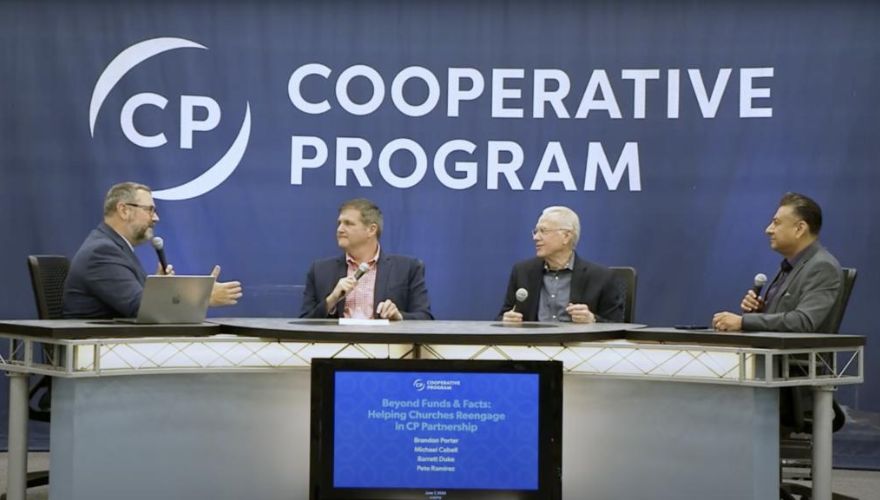
(Left to right): Brandon Porter, Michael Cabell, Barrett Duke, Pete Ramirez.
INDIANAPOLIS (BP) — Many times, the reason a church disengages from the Cooperative Program (CP) is simple. And that often means getting that church reengaged can be simple too.
In a discussion called “Helping Churches Reengage in CP Partnership,” panelists covered why CP giving is so important and ideas for stressing that importance to individual churches.
The discussion, moderated by Brandon Porter, Southern Baptist Convention (SBC) Executive Committee associate vice president for convention news, featured Michael Cabell, assistant to the executive director at the Kentucky Baptist Convention (KBC); Barrett Duke, executive director-treasurer of the Montana Southern Baptist Convention (MTSBC); and Pete Ramirez, executive director of the California Southern Baptist Convention (CSBC). It was held on the CP Stage in the exhibit hall during the 2024 SBC annual meeting in Indianapolis.
Porter started off by asking each man to talk about how his state convention is helping engage churches in cooperative work.
“In our state we had about 600 churches that had disengaged from our cooperative work,” Cabell said. “Three hundred of those had not engaged in 10 years or more.”
He added that the KBC is passionate about promoting cooperation because “healthy churches are in partnership with other churches.”
Duke said CP is especially critical in a frontier state like Montana, where the oldest Southern Baptist church is only about 70 years old.
“We just don’t have a lot of that depth of history there,” he said. “There aren’t a lot of strong churches there, so it takes all of our churches giving what they can” to support the ministry of Montana Baptists but also for “us to participate in everything else that Southern Baptists are doing.”
In California, Ramirez said, more than half of the churches affiliated with the CSBC did not participate in CP last year.
The convention has created a new tool for churches that will be shared with pastors at regional meetings later this year, he said.
“So many of our pastors … have not understood what the Cooperative Program does and how it funds all the work that we do as a state convention and with our national agencies,” he said, “so education has been huge for our people in California.”
Many pastors in the state did not grow up in the SBC, he said, so the CSBC has focused on creating tools to inform those pastors.
“And we’ve learned a lot from other states as we’ve gone to the Cooperative Program Summit that is held every year by the convention,” he said.
Duke said 20%-25% of Montana Baptist churches do not engage with CP, and often it’s because they don’t realize how they benefit from the relationship. Anytime he speaks at a church or helps a church with a grant from the convention, he is quick to remind them “the Cooperative Program made it possible,” he said.
He added that controversy within the SBC is another reason churches might let CP giving drop out of the budget. And oftentimes there’s not a vocal advocate in the church making the case for CP to be a part of the church’s missions plan.
Cabell said the decline in CP giving is not that churches are giving less. In fact, churches that are engaged are giving more in real dollars than they did 15 years ago. But the drop in CP can be attributed to the fact that there are fewer churches engaged in CP despite a larger number of churches affiliated with the SBC.
California has seen something similar, Ramirez said, and the solution can sometimes be as simply as sending a report in the mail.
“We have some churches that re-engage with us and said, ‘We didn’t realize we weren’t giving,’” Ramirez said.
It’s important for people to realize that CP is not only North American and international missions, but also is close to home, the men said. Each man shared ministries his state was able to support through CP giving, such as migrant ministry in California, church planting in Montana and foster care in Kentucky.
“I think the preposition is really important,” said Cabell. “We’re not really giving to the Cooperative program. We’re giving to missions through the Cooperative Program.”
(EDITOR’S NOTE — Laura Erlanson is managing editor of Baptist Press.)


